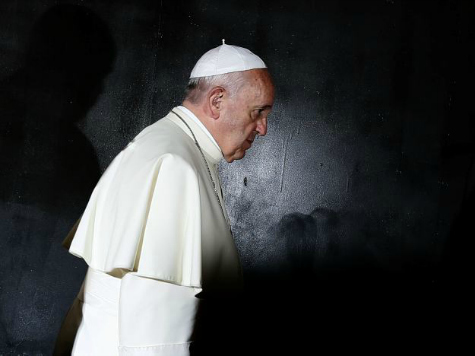Israelis and Palestinians found themselves in a situation similar to conservative and liberal Catholics in the United States as they attempted to decipher the words and actions of Pope Francis, wondering if he has a side and which one he’s on.
Francis became the first Pope to visit Israel by first flying into what he called the “state of Palestine” even though the Vatican does not officially recognize such a state.
What’s more, on his way to Bethlehem, the town where Jesus was born, in what has been described as a spontaneous moment, Francis paused and prayed at the security wall that protects Israelis from terrorist attacks. This was seen as clear support for Palestine.
The wall, which surrounds three sides of Bethlehem, has become a symbol for Israel’s enemies and sticking point for the Catholic Church since it inconveniences the Christian community who are largely Palestinian. Francis prayed near graffiti slogans including “Bethlehem looks like a Warsaw ghetto.”
On the other hand, Francis placed a wreath at the grave of Theodor Herzl, the founder of the Zionist movement and father of the modern state of Israel. On Monday, he visited Yad Vashem, the revered museum of the Shoah, sat with Holocaust survivors, and kissed their hands. At Yad Vashen he said the Shoah had no equal in horror, calling it “a great evil… such as never happened under the heavens.”
Because of Israeli concern about his spontaneous stop at the security fence, a visit to the memorial of Jewish victims of terrorism was hastily arranged. While there Israeli Prime Minister Benjamin Netanyahu told the Pope the security fence was necessary to prevent terrorism that is ongoing. To underscore his point, Netanyahu steered Francis to the exhibit memorializing the 1994 attack against a Jewish association in Buenos Aires that took 85 lives. Francis was auxiliary bishop in Buenos Aires at the time of the attack.
Perhaps more than any other sovereign actor, the Holy See threads a very fine needle in Israel. The Church sees the Jews as “our older brothers in the faith.” In fact, Francis used this phrase on this current trip. The Holy See has recognized Israeli statehood and traded diplomats with Israel since 1994. While the Church does not recognize Palestinian statehood per se, the Holy See sends an apostolic delegate to deal with issues there.
The Church, however, is deeply concerned by the shrinking population of Christians in the region overall but also at or near the Holy Sites. It is a distinct possibility one day soon that Christians will disappear from the Middle East. According to the CIA World Factbook, there are only 378,000 Christians in the birthplace of Christianity, most of them Palestinian.
The Holy See understands the real threat to Christians in the Middle East certainly does not come from Israel but from Islamist movements that actively murder Christians, burn churches, and kill those who convert from Islam to Christianity. The Church opposed the Iraq war, for instance, among other reasons, for fear of what would happen to the Iraqi Christians whose numbers continue to shrink precipitously.
Into this milieu Pope Francis became the third Pope to visit the region. Pope Paul VI visited in 1964; Benedict XVI visited in 2009 and called for a Palestinian state.
In perhaps the most newsworthy moment of his trip, also reported as spontaneous, Francis invited the head of the Palestinian Authority and Israeli President Shimon Peres to visit with him at the Vatican on June 6th to pray for peace, an invitation both accepted.
George Weigel, papal biographer, told Breitbart News, “The ‘ewe’ was the invitation to Peres and Abbas, a fine gesture on the Holy Father’s part. But the key to peace between Israel and the Palestinians remains the Palestinians’ capacity to develop a civil society capable of supporting a government that can make peace. That remains to be done.”
Robert Royal, president of the Faith and Reason Institute and frequent commentator on EWTN, the global Catholic cable network, told Breitbart News, “There’s no harm in his seeking to have them meet, but also not much chance that the air in Rome will significantly alter what both sides have been thinking, saying, and doing over the years – since that’s pretty much dictated by circumstances, which haven’t changed.”
David Goldman, a respected commentator on global affairs, told Breitbart News, “The invitation to Mahmoud Abbas and Shimon Peres to pray for peace at the Vatican next month was especially confusing. Shimon Peres is a ceremonial rather than a political leader and has no mandate to negotiate on behalf of Israel.”
Goldman, who is Jewish, said:
As far as I know, Peres does not pray. And if he were to pray according to Jewish law, in my understanding, he could not easily do so at the Vatican, because Jews do not pray in the presence of Christian symbols. I do not know Muslim law well, but the same restriction would seem to apply to Abbas. Abbas has a bigger problem, namely embracing the terrorists of Hamas on one hand while proposing to pray for peace alongside the Holy Father.
I do not understand what Pope Francis has in mind. He appears to have a mystical belief that prayer can accomplish by miracle what all the world’s statesmen have failed to do by negotiation. There is no harm in hoping for miracles, to be sure, but I worry that this kind of gesture may raise inappropriate expectations and lead to disappointment.

COMMENTS
Please let us know if you're having issues with commenting.